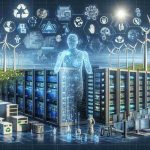Industrial AI Center Leads Green Innovation in Environmental Expo
In a groundbreaking move towards sustainable innovation, the Hong Kong Industrial Artificial Intelligence and Robotics Center (FLAIR) is focusing on green technology to catalyze environmental progress. Their pioneering efforts were recently showcased at the 2024 International Environmental Expo in Hong Kong.
Revolutionary Waste Management Solutions
At the center of FLAIR’s showcase was Green AI Technology Limited, a subsidiary devoted to using AI to enhance recycling processes. This startup has developed advanced AI systems combining visual recognition with near-infrared sensor technology, enabling precise analysis of materials. Unlike traditional waste sorting tech that mimics human sight, their innovation delves deeper into the material’s spectral properties, significantly boosting recyclability and resource reuse.
Strategic AI Applications in Industry
The implementation of these technologies surpasses conventional recycling methods. They are integrated into sophisticated collection and sorting systems, offering unprecedented efficiency and accuracy. Within the Hong Kong waste management framework, these AI-driven solutions are already operational, highlighting FLAIR’s prowess in environmental tech.
Future Outlook and Collaborative Endeavors
Ronnie Law, the technical director of Green AI Technology, affirmed their commitment to transforming research into tangible applications for sustainability in Hong Kong. Looking ahead, FLAIR and Green AI emphasize the strategic role of AI in evolving industries and spearheading sustainable development. Their initiatives align with governmental policies advocating green tech, positioning Hong Kong as a leader in smart city advancement and international innovation hub.
This pivotal moment at the Environmental Expo showcases Hong Kong’s growing influence in the integration of AI within the ecological sphere, promising a sustainable and technologically advanced future.
Effective Strategies for Integrating AI into Environmental Sustainability
As highlighted by the recent advancements showcased at the International Environmental Expo, Artificial Intelligence (AI) is paving the way for significant strides in sustainable development. With its transformative potential, AI presents numerous opportunities to enhance recycling and waste management, promoting a greener future. Here are some tips, life hacks, and interesting facts on how AI can further bolster sustainability efforts:
1. Smart Waste Management Practices
AI is revolutionizing waste management by automating sorting processes, reducing human error, and increasing efficiency. Here are some ways to leverage this technology:
– Use AI-powered apps: Implement applications that help classify and segregate waste efficiently, minimizing contamination in recycling streams.
– Optimize collection routes: Leverage machine learning algorithms to optimize waste collection routes, reducing fuel consumption and carbon emissions.
– Predictive analytics: Employ predictive analytics to anticipate waste generation patterns, facilitating more effective waste management strategies.
2. Enhancing Recyclability with AI
The use of AI in recycling helps businesses and individuals maximize material recovery. Consider the following hacks:
– Material Recognition Systems: Utilize AI-driven visual recognition paired with sensor technology to accurately identify and sort recyclable materials. This enhances the quality of recycled outputs and reduces misclassification.
– Real-time Monitoring: Implement systems that provide real-time monitoring and feedback, informing adjustments in sorting processes that lead to better outcomes.
3. Collaborative Initiatives for Greater Impact
Innovation thrives in collaboration. Here’s how stakeholders can collaborate to amplify AI’s benefits for environmental conservation:
– Public-Private Partnerships: Develop strong partnerships between governments, AI companies, and environmental organizations for resource sharing and technology development.
– Community Engagement: Engage communities by raising awareness and promoting education on using AI for environmental initiatives. This encourages grassroots support and participation.
4. AI and Sustainability: Intriguing Facts
– AI in Agriculture: AI technologies like drones and satellite imagery are being used to monitor crop health and optimize resource use, leading to more sustainable agricultural practices.
– Energy Efficiency: AI systems can be employed to optimize energy use in buildings by predicting occupancy patterns and adjusting settings for lighting, heating, and cooling accordingly.
5. Future Prospects: AI and Smart Cities
The integration of AI into urban environments can lead to smarter, more sustainable cities, as demonstrated by initiatives in places like Hong Kong:
– Traffic Management: AI real-time traffic monitoring and analysis can reduce congestion and emissions, making urban travel more efficient.
– Pollution Control: Use AI systems to track pollutants and devise targeted actions to reduce environmental harm.
For more information on AI’s sweeping impact across various industries, including environmental tech, visit IBM or explore Microsoft for insights on smart city development. These organizations are leading the way in leveraging AI for positive environmental change.






















